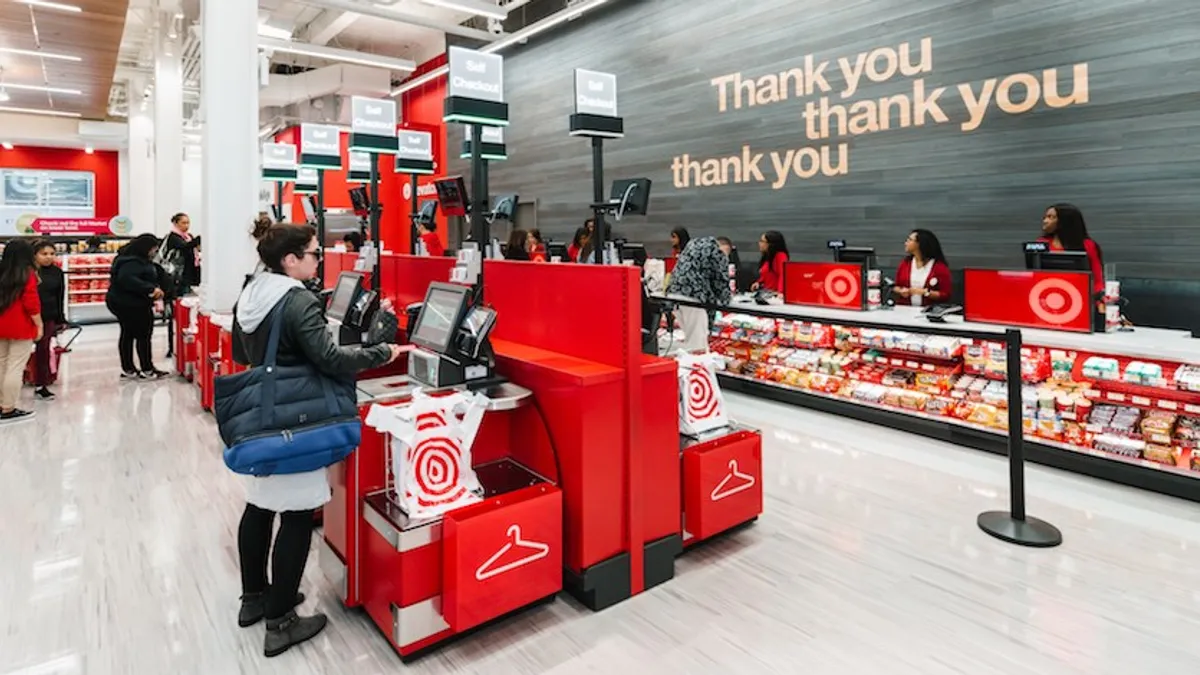Dive Brief:
- Target is in preliminary talks to acquire WPP's Triad Retail Media unit, The Wall Street Journal reported, citing anonymous sources familiar with the situation. Since the talks are preliminary, the sources said a deal won't necessarily go through.
- Triad helps brands design digital advertising campaigns and also sells media space on retailers' websites. The Journal speculated that Target acquiring Triad would be a move intended to equip the company with the talent and technology necessary to sharpen its in-house ad sales expertise at a time when its biggest rivals, Walmart and Amazon, are doing the same.
- Target has an existing relationship with WPP as a large media-buying client. Walmart worked with Triad as one of its top clients, but dealt the unit a heavy blow when it decided to in-house its digital advertising and data analytics operations earlier this year. Triad was previously owned by the private-equity group Rockbridge, which sold the division to WPP's Xaxis for $300 million in 2016.
Dive Insight:
While Target's discussions with Triad are reportedly only in the preliminary phase, pursuing the group would make sense for the big-box retailer if it wants to keep up with two key rivals that are quickly ramping up their advertising businesses. Triad's prior work with Walmart, which ended in February, adds an interesting fold to the situation, since the unit could have deep knowledge of Walmart's media strategy, which Target could wield to its advantage. WPP moving to sell off Triad wouldn't be surprising since Walmart drove so much of the retail media division's business. WPP has overall been looking to tighten its belt and is in the midst of finding a buyer for its data analytics unit Kantar.
In any case, Triad specializes in the types of digital campaign creation and ad sales that Target has signaled clear interest in with Roundel, a revamped media network unveiled during Target's debut at the IAB's Digital Content NewFronts earlier this month. Formerly known as the Target Media Network, Roundel expands Target's coverage of ad placements beyond its website to include other publishers, like Pinterest — a platform the retailer frequently works with — and PopSugar.
Rumblings of a Target deal for Triad emerge as Walmart has also started to more clearly map out its advertising plan. Beyond in-housing its ad sales, the company in April purchased the cloud-based ad serving platform Polymorph Labs. Like Target, Walmart also made its first appearance this year as a presenter at the NewFronts, a glitzy, week-long slate of pitches that publishers make to advertisers to strike deals and win more of their dollars.
Walmart is apparently extending its pitch beyond the NewFronts as well, where it mostly discussed its streaming service Vudu. Earlier this week, Reuters reported that the company will host a new corporate event called 5260, its first direct pitch to brands on its advertising services. The gathering to be held in New York City next week will draw heavy hitters, such as Procter & Gamble (P&G), Unilever and Coca-Cola, according to Reuters.
Target and Walmart heavily hawking their media networks show the retailers following in the steps of Amazon, which has steadily built out its internal advertising capabilities and seen explosive growth in its ad sales in recent years. The legacy big-box retailers have frequently differentiated their pitches to brands based on a wealth of first-party data, which they've accrued, not only from e-commerce — the domain of Amazon — but also in-store transactions. Target and Walmart have fared far better financially than many of their retail peers, in part thanks to their agility in adapting to digital shopping trends and tying those channels back to their physical footprint.
Outside of keeping up with Amazon, Target and Walmart could be responding to major advertisers in categories like CPG that are hungry to leverage first-party data and rely less on platforms grappling with public image crises and mounting regulatory scrutiny, like Google and Facebook. P&G and Unilever, two of the top advertisers in the world by media spend, recently reinforced that they will only put their digital ad dollars toward "trusted" partners that promote transparency and brand safety. At the NewFronts, Target and Walmart separately made veiled swipes at the digital advertising duopoly in their pitches, with Kristi Argyilan, president of Roundel, touting a commitment to "data privacy and maintaining a brand-positive environment."















